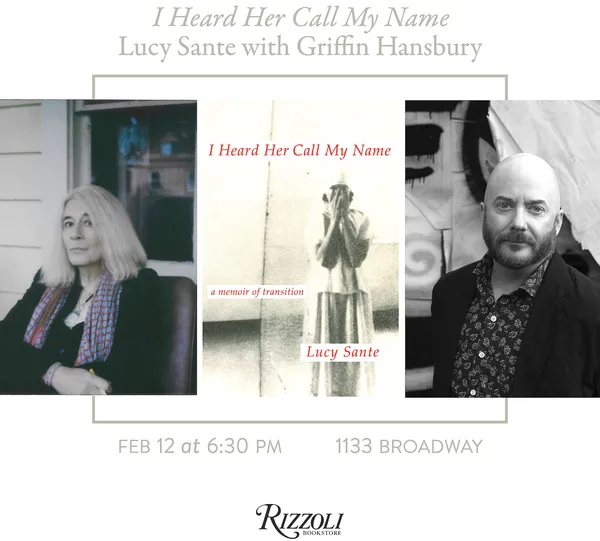 |
| I Heard Her Call My Name upcoming event: Lucy Sante with Griffin Hansbury at Rizzoli in New York on February 12. |
In the first instalment with author, critic, and artist Lucy Sante (her upcoming book is I Heard Her Call My Name: A Memoir Of Transition, published by Penguin Press on February 13, 2024), music producer and 99 Records founder Ed Bahlman joined us. In this second instalment we discuss Lucy coming from Belgium as a young boy to New Jersey; fighting to survive school in Manhattan, dandyism, and the unattractive prospect of masculinity; her book Nineteen Reservoirs: On Their Creation And The Promise Of Water for New York City (published by Experiment in 2022), and touch upon Nancy Buirski’s documentary Desperate Souls, Dark City And The Legend Of Midnight Cowboy and Jon Voight’s boyishness as Joe Buck in John Schlesinger’s film.
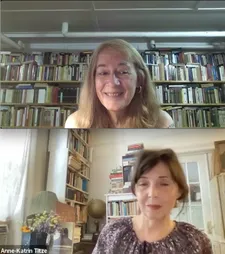 |
| Lucy Sante with Anne-Katrin Titze on going to an all-boys Jesuit high school on the Upper East Side of Manhattan: “I really did not fit in.” |
Lucy Sante is also the author of Low Life: Lures And Snares Of Old New York (1991); Evidence (1992); The Factory Of Facts (1998); Walker Evans (1999); Gangs Of New York: Making the Movie (2003); Kill All Your Darlings: Pieces 1990-2005 (2007); Folk Photography: The American Real-Photo Postcard, 1905-1930 (2009), The Other Paris (2015), and Maybe The People Would Be The Times (2020). Her honours include a Whiting Writers Award (1989); an Award in Literature from the American Academy of Arts and Letters (1997); a Grammy Award for Best Album Notes for the reissue of Anthology of American Folk Music at the 40th Grammy Awards (1998); an Infinity Award from the International Center of Photography (2010), a Guggenheim Fellowship (1992-1993) and a Cullman Center Fellowship from the New York Public Library (2012). Lucy recently retired after 24 years teaching at Bard College.
From Upstate New York, Lucy Sante joined me on Zoom as we continue our in-depth conversation.
Anne-Katrin Titze: I’d love to start out by talking about Nancy Buirski’s wonderful film about and around Midnight Cowboy. You made very interesting comments about the zeitgeist and how we never really know the zeitgeist while we’re living it.
Lucy Sante: Yeah, every work of art is about the time of its making fundamentally. And that is unknown to the makers.
AKT: Questions of masculinity are also a big topic in this documentary. The discussion of the ambiguity resulting in casting Jon Voight in Midnight Cowboy, who comes across as so childlike. Questions of masculinity are very much in the air right now, I think.
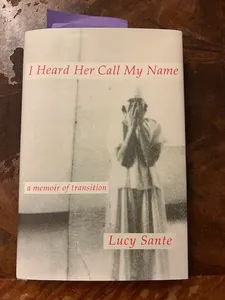 |
| I Heard Her Call My Name: A Memoir Of Transition by Lucy Sante (Penguin Press, February 13, 2024) Photo: Anne Katrin Titze |
LS: Oh yeah.
AKT: It’s not a specific question, but I’d like to hear more of your thoughts on that topic in relation to then and now!
LS: Start me off with a simple one, don’t you? I mean, pontificating is something I reach, I don’t start with pontificating. But, yeah, when the movie came out I was 15 and did not have the standard notions of masculinity. I barely knew what it was. I mean, as I know now, and as I knew then but would not have admitted under gunpoint, I was trans. I knew that.
And masculinity was a hostile thing that I had to engage with. I was commuting every day, two hours each way, from New Jersey to an all-boys Jesuit high school on the Upper East Side of Manhattan where my classmates were all going to be lawyers or priests. And I really did not fit in. And there were these gay kids who were interesting; I felt sympathy for them but I wasn’t part of that either.
I was nowhere; I don’t know who I was. I was an immigrant for one thing. I still had an accent, I was trying to pass myself off as an American. You know, it was a whole world of uniforms that one was required to put on and none of them fit me. And masculinity was just a punitive machine. I just came out of three years of junior high where I was in fights every single day. Masculinity was not an attractive prospect. The best I could do was dandyism.
AKT: In college I was working on the subject of dandyism and it felt like a little capsule of freedom within masculinity. I remember vividly as a maybe ten-year-old, the thought about all those poor boys who can’t wear dresses in the summertime. How can you make it through summer without dresses? That’s so mean!
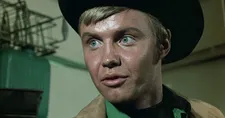 |
| Jon Voight as Joe Buck In John Schlesinger’s Midnight Cowboy |
LS: Furthermore, it really occurred to me ten, twenty years ago, that in my youth - and I mean from when I started going to New York City 1968 well into the Eighties, if not the Nineties - no male my age would ever have been caught dead wearing shorts. Unless you were at the beach. There was no short-wearing going on at all. We were wearing dark jeans and dark shirts all through the summers. How did we do it? I have no idea.
AKT: It’s almost like a veil!
LS: Chador!
AKT: Right, exactly! One culture has women veiled and another has men in suits of varying kind. In my very naïve thought process as a child, I ruminated about the fact that as a girl you could of course wear pants - as it’s not Katharine Hepburn’s time anymore - but there was also Fred Astaire and I envied the restrictions and the structure of his wardrobe, which wasn’t really accessible for girls. You transitioned shortly after the interview in Andrew Rossi’s Andy Warhol Diaries?
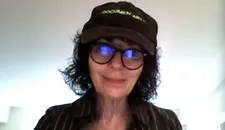 |
| Desperate Souls, Dark City And The Legend Of Midnight Cowboy director Nancy Buirski Photo: Anne Katrin Titze |
LS: Yeah, and after I wrote the book [I Heard Her Call My Name: A Memoir Of Transition], really.
AKT: You grew up in Belgium?
LS: I grew up 25 kilometers from the border. My town is equal distance from Aachen and from Maastricht in The Netherlands. That gives you an idea. I’m from the Belgian Rust Belt.
AKT: Do you ever go back there?
LS: I was going there every year in the Nineties when I was writing a book. In this century, I went back last year [2022]. It was the second time I’ve been back since 2000 and it was very very distressing because my town, which was a textile industry town…
AKT: Textile?
LS: Wool, yeah. Even at the beginning of the 21st century, the last time I had been there, all the old factories were still in place in this wonderful red-brick city. And now all the factories have been torn down. And they haven’t really been replaced by anything except gyms or something like that. So it looks like one of these midwestern Rust Belt cities here that are just holes.
 |
| Nineteen Reservoirs: On Their Creation And The Promise Of Water For New York City by Lucy Sante (Experiment, 2022) |
And furthermore, I owe my life to a street, which was a one-block street in which both sides of my grandparents lived. One on one side, the other on the other. That’s how my parents met. The street no longer exists; there’s a supermarket in its place now.
AKT: The disappearing past and the attempt to keep traces alive are fascinating subjects. A street no longer existing brings me to your latest book before the memoir about a town no longer existing. I had no idea that water supply was a problem for New York. Polanski’s Chinatown was my reference; I thought California had this problem but not New York State. How did you become interested in that topic?
LS: Well, I’ve been living up here full-time for 23 years and before that seven years in Delaware County, which is further northwest, where I was near the Pepacton Reservoir. And then I was near the Ashokan reservoir. I mean, it’s inescapable up here, reservoirs. When you drive into reservoir territory, especially near Ashokan, you feel like you’re not in your own place anymore. Because you’re in something that’s owned and administered by New York City. So the roads are different, the laws are different, everything is different. I’ve been through drought years where the reservoirs are very low, that includes last year [2022], by the way.
I had a friend who started working as an editor at a San Francisco-based online architecture and ecology magazine called Places Journal. And she asked me to contribute something. It’s not my normal subject until I thought of the reservoir. So I wrote a series for them on these reservoirs and then a publisher picked it up and decided to issue it as a book. So I still don’t think of it as a real book, you know. To me it’s a magazine series. Anyway it’s been very popular in this area. I had a lot of response. A lot of response from people whose grandparents had to leave their homes in 1914 or whenever it was.
Read what Lucy Sante had to say on Sara Driver’s Boom For Real: The Late Teenage Years Of Jean-Michel Basquiat; Andrew Rossi’s Andy Warhol series; William Burroughs and crime novels; Whit Stillman and Steiff animals; writing lyrics for The Del-Byzanteens, and Ed Bahlman’s 99 Records.
I Heard Her Call My Name: A Memoir Of Transition (Penguin Press) is available starting on Tuesday, February 13, 2024.





















